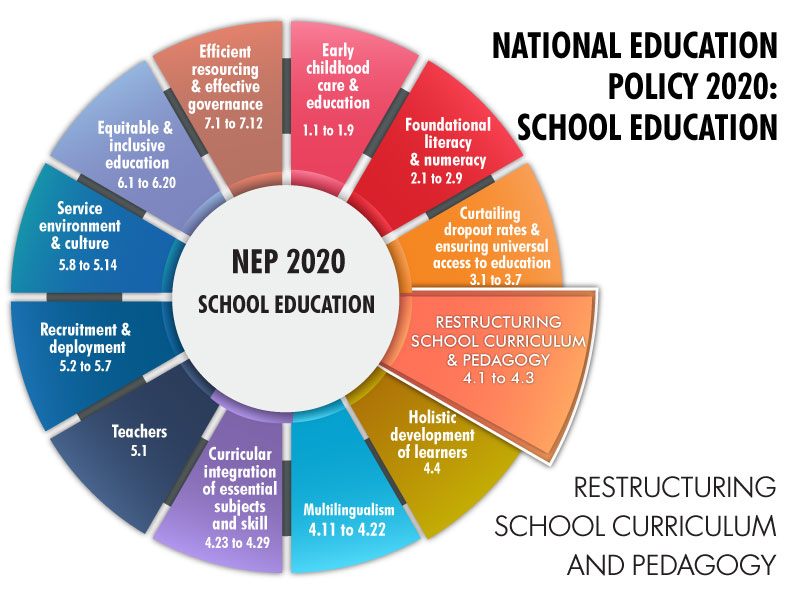The NEP 2020 has reconfigured the curriculum and pedagogy of school education to 5 + 3 + 3 + 4 design with an aim to make them responsive and relevant to the developmental needs and interests of learners at different stages of their development. However, it will not be necessary to make any parallel changes to the physical infrastructure. The policy aims at producing engaged, productive, and contributing citizens for building an equitable, inclusive, and plural society as envisaged by our Constitution.
Restructuring school curriculum and pedagogy
The Foundational Stage will consist of play/activity-based learning and the aforementioned curriculum and pedagogy of ECCE. The Preparatory Stage will transition gradually with the introduction of some (light) textbooks, in order to lay a solid groundwork across subjects, including reading, writing, speaking, physical education, art, languages, science, and mathematics. The Middle Stage will see the introduction of subject teachers for learning/discussion of the more abstract concepts in each subject that students will be ready for at this stage, across the sciences, mathematics, arts, social sciences, and humanities. The High School Stage will comprise four years of multidisciplinary study, but with greater depth, critical thinking, attention to life aspirations, and greater flexibility and student choice.
The curricular and pedagogical structure and the curricular framework for school education will therefore be guided by a 5 + 3 + 3 + 4 design, consisting of the Foundational (3 years of preschool + Grades 1-2), Preparatory (Grades 3- 5), Middle (Grades 6-8), and High school (Grades 9-12 in two phases, i.e. 9 and 10 in the first and 11 and 12 in the second) stages respectively, with an option of exiting at Class 10 and re-entering in the next phase.
All four stages, in accordance with what may be possible in different regions, may also consider moving towards a semester system.
To close the gap between the current state of learning outcomes and what is truly needed, classroom transactions may shift in certain subjects, as appropriate towards competency-based learning and education. The assessment tools (including assessment “as”, “of” and “for” learning) must also be aligned with the learning outcomes, capabilities and dispositions as specified for each subject of a given class. To achieve this, in all stages, experiential learning must be adopted as standard pedagogy within each subject, with explorations of relations among different subjects.
Read: NEP 2020: SCHOOL EDUCATION | Curriculum and Pedagogy
Also read: NEP 2020: SCHOOL EDUCATION | Holistic development of learners
Also read: NEP 2020: SCHOOL EDUCATION | Multilingualism
